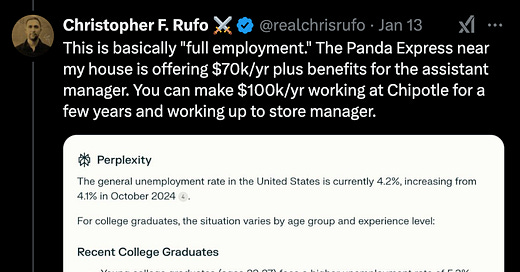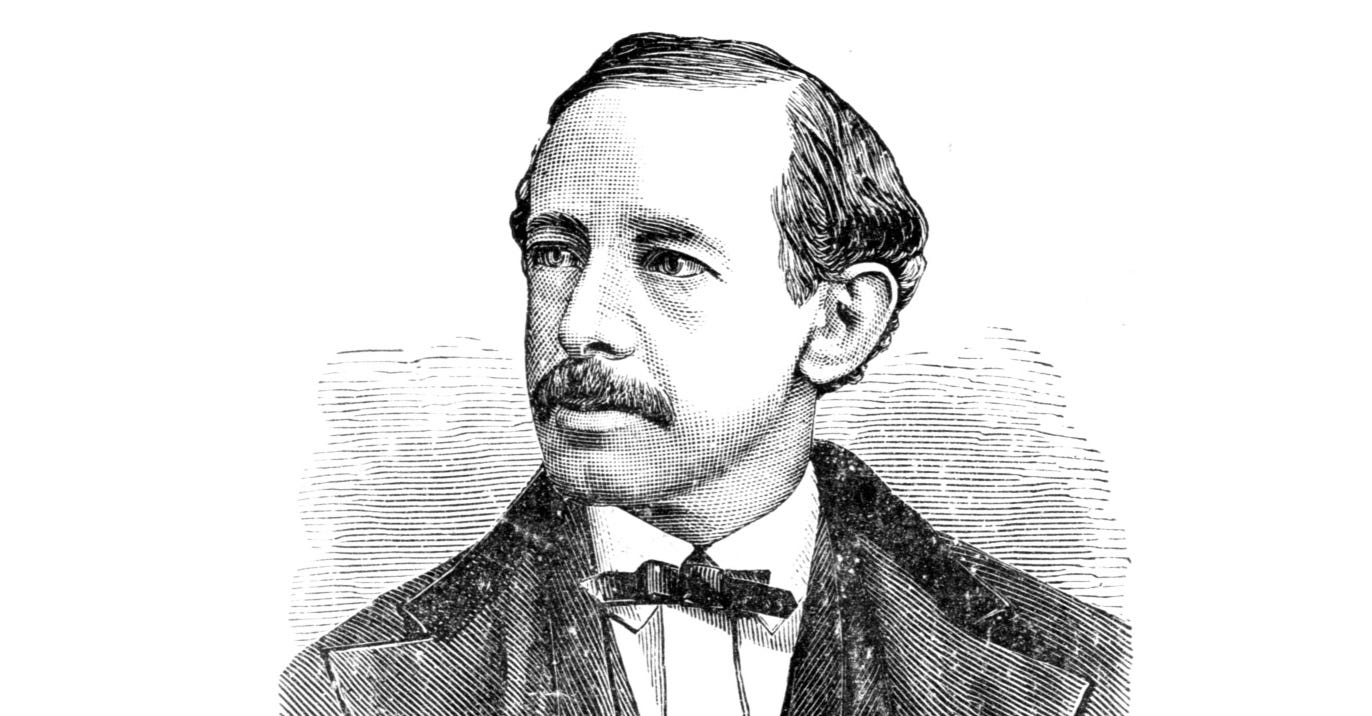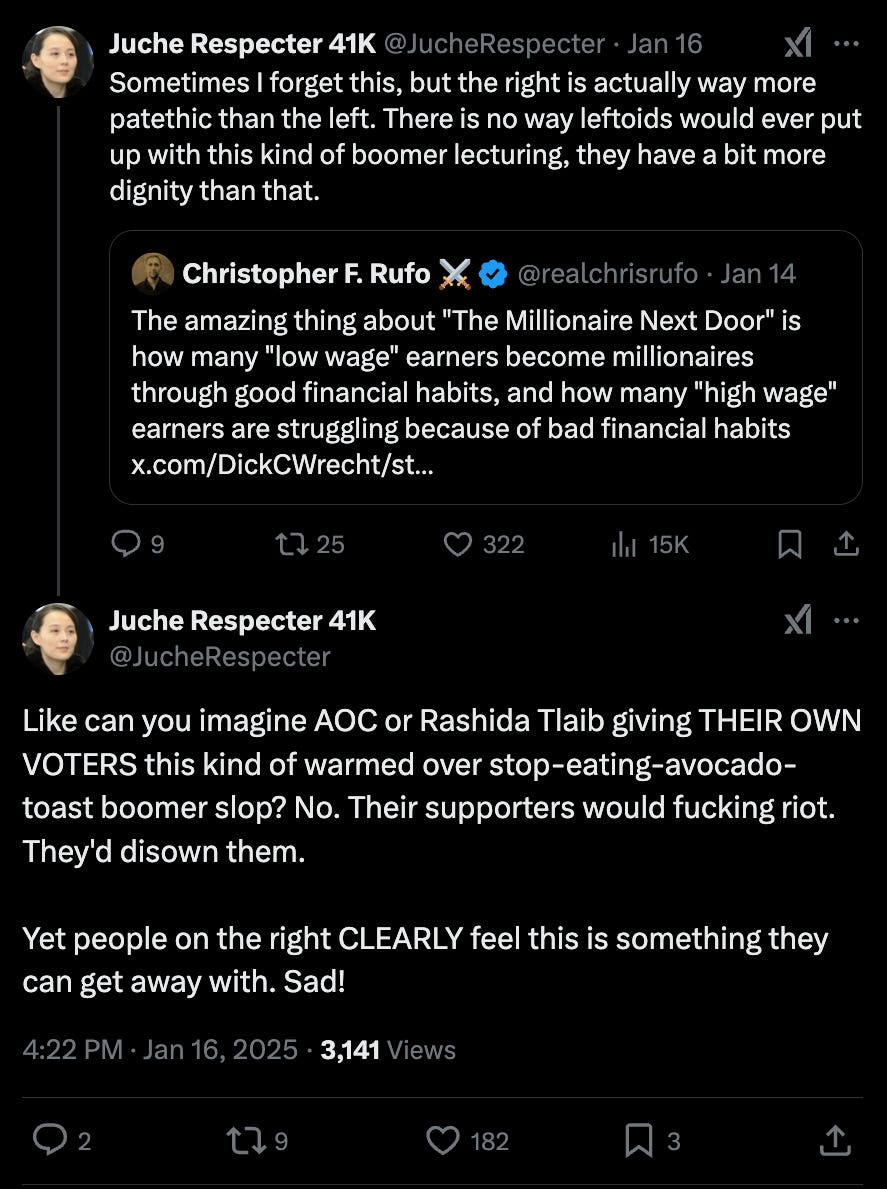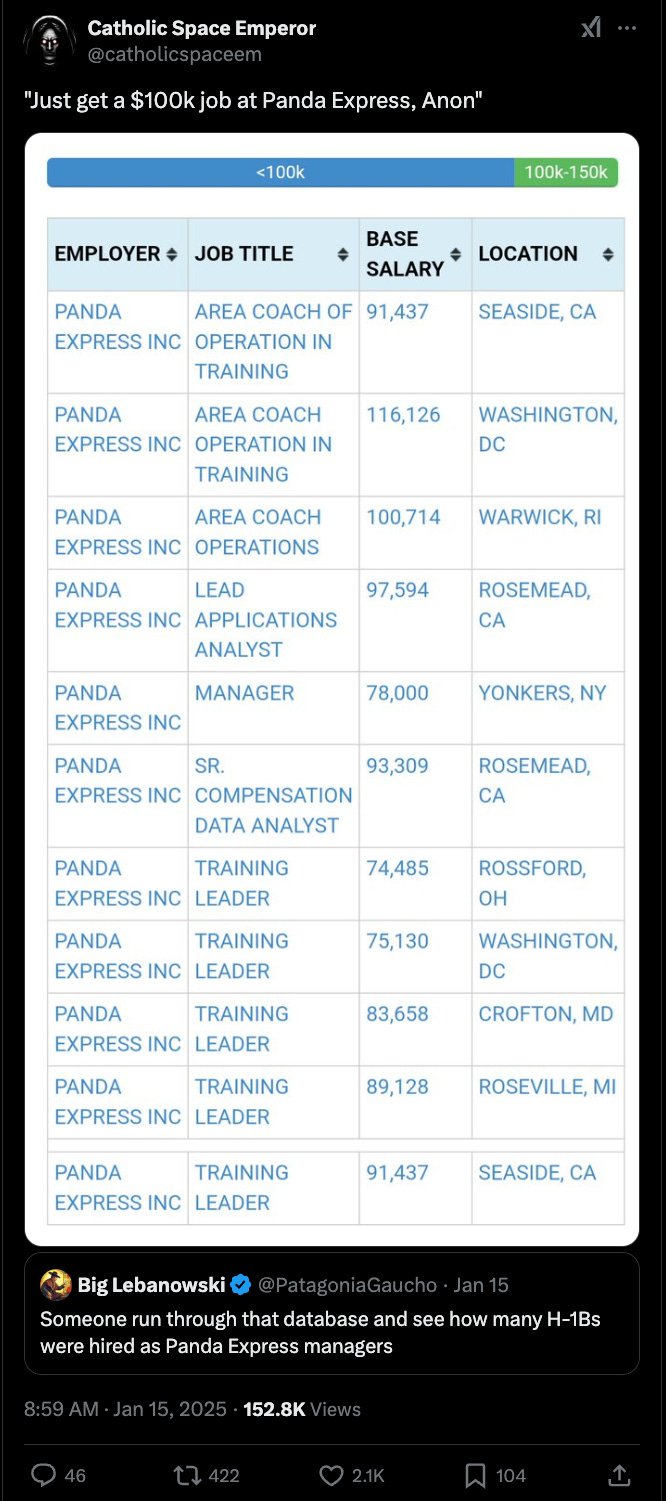My long and checkered career of crap jobs included a brief 1990s stint at a Georgia McDonald’s. I soon discovered my eye-hand coordination was not sufficient to flip a dozen burgers at once. My supervisors discovered it even sooner. But what makes this embarrassing interlude relevant is that those supervisors were all people from modest homes and trailer parks who worked hard in the hopes they would wind up a store manager or even a district supervisor.
For its part, Ronald was happy to train promising shift workers of any race or educational level. They would educate them in classes and even offered tuition reimbursement to help them move up the managerial ladder. For people who grew up in generational poverty, McDonald’s and other franchise restaurants offered a slim chance of moving up in the world — and slim is a hell of a lot better than none.
Chris Rufo isn’t entirely wrong. There’s something to be said for starting at the bottom and working your way up. But his comments, which he doubled down on, sparked a tidal wave of condemnation among young people. This sparked yet another tidal wave from Boomers and MAGA fans bitching about lazy, entitled young people.
So what’s going on here? Our world has moved once again from Disenchantment to Enchantment. Where we once demanded facts, we now seek comfort in myths. And Christopher Rufo, like many of his regular readers, has found solace in one of America’s most enduring legends.
When he was just a boy, Horatio Alger Sr. declared bankruptcy and moved the family to a new parish after losing their home. Alger made high grades at Harvard but his family’s modest position kept him from joining the best clubs. And his brief career as a pastor ended abruptly in 1866 after admitting to multiple unsavory allegations about his behavior with young boys.
Like his heroic urchins, Alger’s road to riches was a rocky one. His writing efforts brought him little money until 1867, when School and Schoolmate serialized the regrettably named Ragged Dick, or Street Life in New York. The magazine sold briskly and in 1868 the novel became a bestseller. The disgraced pederast was now a prominent children’s book author.
Alger repeated his successful formula dozens of times. A hardworking vagrant boy of good character triumphs over adversity and is rewarded with a respectable job. But unlike his plucky protagonists, Alger never achieved financial security. His children’s books became unfashionable. His adult novels attracted little attention. When he died in 1899, he had already slipped into obscurity.
Few today read Horatio Alger. But just about everyone knows that a “Horatio Alger story” is a tale of an enterprising hero who pulls himself up by his bootstraps and makes his way out of poverty through hard, honest work. Alger’s work may be forgotten, but his contribution to the American Myth endures.
At the time Alger was writing, America was reaping the rewards of the Industrial Revolution. There were still opportunities for the enterprising to succeed with diligence and hard work. And while Alger’s work had plenty of unethical misers and wealthy gentlemen, it also assuaged the guilt of the wealthy. If Alger’s heroes could triumph, those left behind obviously failed because they lacked morals and initiative.
Alger’s Puritan ancestors came to the New World in search of religious freedom. Pioneers who made their way westward tamed a wild land and pacified the wild Indians. Immigrants passed through Ellis Island in search of streets paved with gold. Not everybody succeeded, but enough triumphed to keep the dream alive. Alger didn’t create a new myth with his stories so much as he crystallized an old one.
After World War II, an economic boom saw two generations of Horatio Alger stories fulfilled. Poor vets came out of the military, went to college on the GI bill, and moved out of the tenements and tarpaper shacks into suburban housing developments. They worked hard and were rewarded for their efforts. It’s not surprising that those who benefited from that prosperity believe that those stories still come true.
Once the Party of Plutocrats, Trump has transformed the Republicans into the Party of the Working Man. You could argue that Trump is a plutocrat and the Republicans regularly screw over the working man. You wouldn’t necessarily be wrong, but you’d be missing the point. In politics, perception is more important than reality. So long as the working classes believe Donald Trump supports them, they’ll keep rewarding him with their vote.
Working people pride themselves on earning a living, and look down on those who rely on government handouts. For a long time social workers had difficulty getting Appalachian families to take charity. Now that the mines are closed, welfare has become the default setting in many Appalachian communities — and suicide, addiction, and violence rates have risen precipitously.
The Democrats, by contrast, have been the Party of the Social Safety Net since FDR and LBJ. They’re loath to give anybody the “pull yourself up by your bootstraps” speech, because it looks classist and elitist. Wealthy Democrats have no problem with the government providing assistance to those in need. (They often have a problem with rising taxes, but lots of us have difficulty with the concept of cause and effect).
Juche Respecter and former Eurabiamania guest Malcom Kyeyune is absolutely right that the Left would never make this kind of condescending foot-in-mouth post. He’s 100% on the money with his claims that the Left would revolt if they did. But they would revolt not because they were personally offended, but because, in traditional American Leftist fashion, they were offended on someone else’s behalf.
What we see on the American Left are the last dying embers of noblesse oblige. Most American Leftists consider themselves members of the cultural Elite. Much like the post-Civil War Abolitionists who were shocked to discover Negroes were now moving into their city, they’ll happily make noises about poor-shaming and UBI so long as they can keep the poor at a safe distance.
Alongside this fondness for spending government money we’ve seen a growing contempt for America’s White working classes. To make things even more interesting, most of that hate comes from Whites and Fellow Whites. They will use all the classic stereotypes — rusty pickup trucks, missing teeth, incest, country music — but they won’t condemn them for relying on welfare.
When we get to the political fringes, the divisions become polar opposites. Dissident Right figures like Christopher Rufo believe that all humans should strive to be useful. They contribute to their society, they raise their families, they work hard and provide their employers with more value than they take from their salary and benefits. Here we see yet another of America’s underpinning myths, the Protestant Work Ethic.
The Dissident Left prioritizes the useless. To be able-bodied, conventionally attractive and gainfully employed is to be privileged. Those privileges blind you from seeing the suffering and oppression upon which our society rests. Not only should we support our weakest and neediest, we must also listen closely to their counsel as their suffering has given them special insights.
In both cases we see the influences of American Christianity. The Dissident Right is strongly influenced by what Max Weber called the Protestant work ethic. Rufo and his circle see hard work as a character-building virtue. It is not just a means, it is an end in itself. They favor workfare like the English favored workhouses. They feel that charity is demeaning and corrosive unless it is earned by the sweat of your brow.
The Dissident Left rejects the Protestant work ethic and Christianity in general. But in its rejection it stumbles back into yet another Christian ideal, the Beatitudes. Instead of lifting the poor out of poverty and healing the sick, they see poverty and sickness as things to be celebrated and signs of moral and intellectual superiority. But as has always been the case with reformers, their support only lasts so long as those poor and sick engage in the proper rituals and spout the proper slogans.
America’s working classes never wanted a revolution; they simply wanted a chance for a better life. In America Marxism and its descendants are largely a status symbol for the wealthy and educated. We’ve seen a Civil Rights movement and an ongoing Sexual Revolution that started with feminism and moved on to LGBTQ+ rights, but outside of Occupy Wall Street we’ve seen very little talk about income inequity or poverty.
They may wear Che Guevara shirts, but most American Leftist care about every -ism but classism. Black Lives Matter when a White cops kills one or when a Black actor gets cast in a traditionally White role. But while they’re happy to display signs in their yard, they display little concern for those Blacks who can’t act but can breathe. The Right looks at poverty with contempt, while the Left idolizes it. Neither offer any plans to eradicate it.
Today’s chain restaurants rely largely on immigrants for their labor. They’re more reliable than the young people who traditionally got their first job at a pizza parlor or a burger joint. Immigrants can work longer hours than school kids, and there’s no need to build their schedule around sports practice or upcoming tests.
Many family-owned chain restaurants are owned by first or second-generation immigrants. They tend to hire within their extended family first and within their ethnicity second. If you’re outside those groups, you’re unlikely to get that coveted fry cook spot that might kickstart your career as a restaurant manager.
Those who manage to get hired at their local fast food joint may be waiting a long time to move up the corporate ladder. H1-B hires have done a whammy on those positions just like they’ve devastated entry-level tech jobs. Why hire a citizen when you can pay an indentured servant less?
In response to their recent defeats, some Democratic strategists have begun moving back toward the center. They’ve distanced themselves from the Alphabet People and stopped listing their pronouns in their profiles. They’ve started dropping DEI initiatives and fact checkers. But few have taken steps to learn what makes Trump supporters tick.
Until they understand his supporters, their efforts to win them back will be no more successful than a typical Disney+ series designed by focus groups and committees. If they want to win back the blue-collar workers who once reliably voted Blue, they must bring back the blue-collar jobs. Even more important, they must relearn their respect for the working classes and quit treating them as objects of either pity or contempt.








Key questions: what, in general, to do about poverty and specifically, how to recreate a vibrant, productive middle class? These are not a tasks for politicians alone but for society as a whole - it's a matter of survival. Pease let's have much less "someone over there should" and much more "let's do this right here where we live".
The chance of a burger flipper ever moving up beyond store manager are probably similar to the chances of an able seaman who can hand, reef and steer, becoming an admiral in the old Royal Navy, or of winning the lottery.